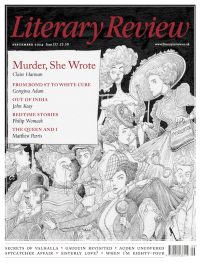William G Naphy
Go Forth and Self-Deny
Lower than the Angels: A History of Sex and Christianity
By Diarmaid MacCulloch
Allen Lane 688pp £35
Lower Than the Angels is the sort of book one has come to expect from Diarmaid MacCulloch. It is immensely broad in scope, incredibly detailed and enormously readable, with no small measure of humour (some of which might be lost on a non-British readership of a certain age). In five hundred pages of text, MacCulloch traces along diverse and divergent pathways Christianity’s relationship with sex. One of the strengths of the book is that, unlike in many other cases, ‘Christianity’ does not mean just the version practised in the West or, more broadly, just Nicaean varieties. This does, however, mean that a broad familiarity with the history of Christianity and some theology would be helpful to readers. To be fair,
MacCulloch pauses from time to time to provide helpful explanations of less well-known types of Christianity, stressing the multifaceted ways in which different churches have viewed sex and sexuality.
The first section of the book reaches back to Christianity’s Judaic roots and to the wider, pagan Mediterranean world. Not only does this set the stage for the discussion that follows, but it also shows the conflicting strands that were, somewhat unhappily, interwoven in early Christian communities. Throughout the book, the reader is presented with unexpected passages, including a discussion of the Jewish God’s wife, Asherah. Present in the First Temple, where she reigned alongside her consort, she was subsequently marginalised. All this makes clear just how varied were the ideas about sex, marriage and sexuality that fed into early Christianity. What is most obvious is how profound was the impact of the Graeco-Roman world, most significantly its ideas about women. Indeed, the book’s subtitle could easily have been ‘A History of Women, Sex and Christianity’. The profoundly negative view of women in the Graeco-Roman world, especially in Greek philosophy and medicine, had a deep, lasting and harmful impact on Christianity.
The second section focuses on the earliest years of Christianity, and particularly the ideas of St Paul. MacCulloch shows the roots of the lasting struggle within the religion between a positive view of marriage, indeed reciprocity (the ‘marriage debt’), and celibacy as a preferable state. Paul’s support for celibacy, assuming

Sign Up to our newsletter
Receive free articles, highlights from the archive, news, details of prizes, and much more.@Lit_Review
Follow Literary Review on Twitter
Twitter Feed
The son of a notorious con man, John le Carré turned deception into an art form. Does his archive unmask the author or merely prove how well he learned to disappear?
John Phipps explores.
John Phipps - Approach & Seduction
John Phipps: Approach & Seduction - John le Carré: Tradecraft; Tradecraft: Writers on John le Carré by Federico Varese (ed)
literaryreview.co.uk
Few writers have been so eagerly mythologised as Katherine Mansfield. The short, brilliant life, the doomed love affairs, the sickly genius have together blurred the woman behind the work.
Sophie Oliver looks to Mansfield's stories for answers.
Sophie Oliver - Restless Soul
Sophie Oliver: Restless Soul - Katherine Mansfield: A Hidden Life by Gerri Kimber
literaryreview.co.uk
Literary Review is seeking an editorial intern.